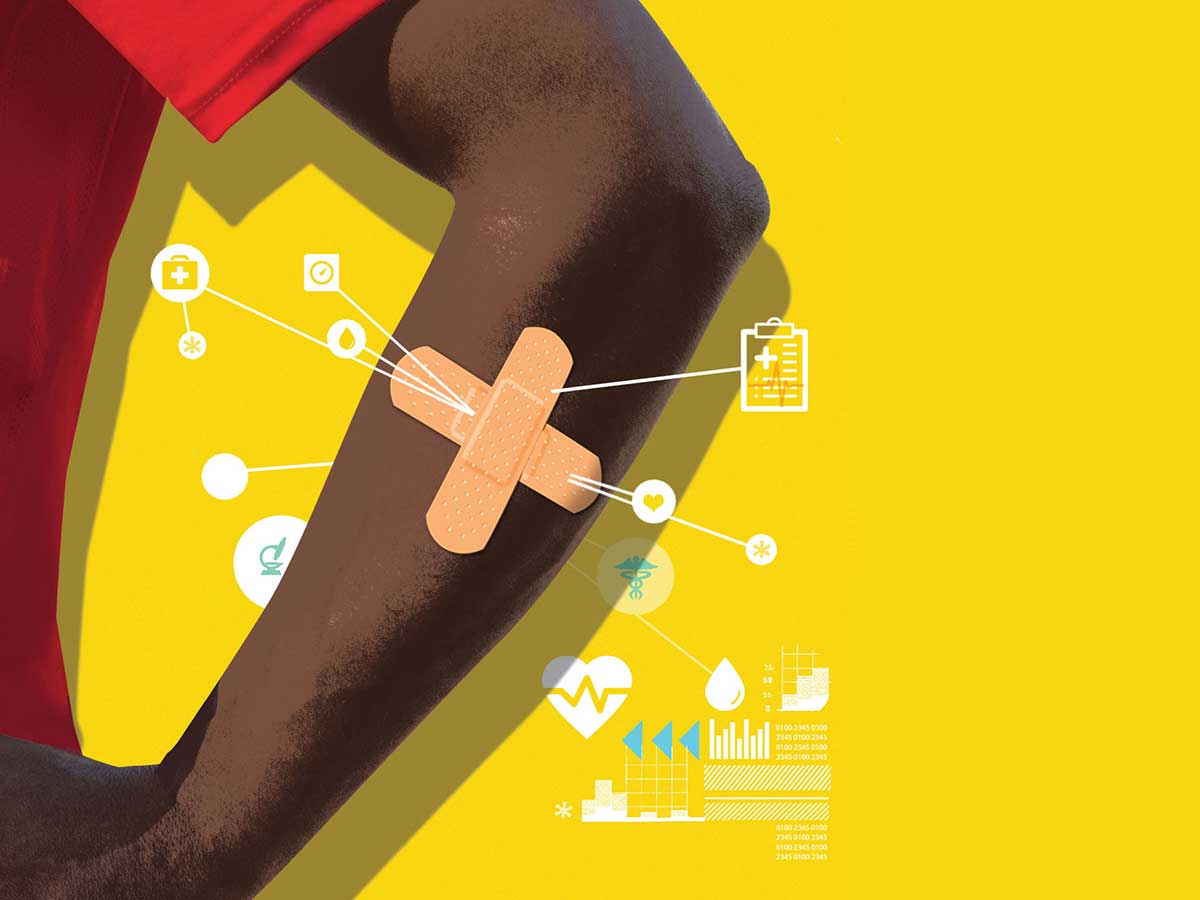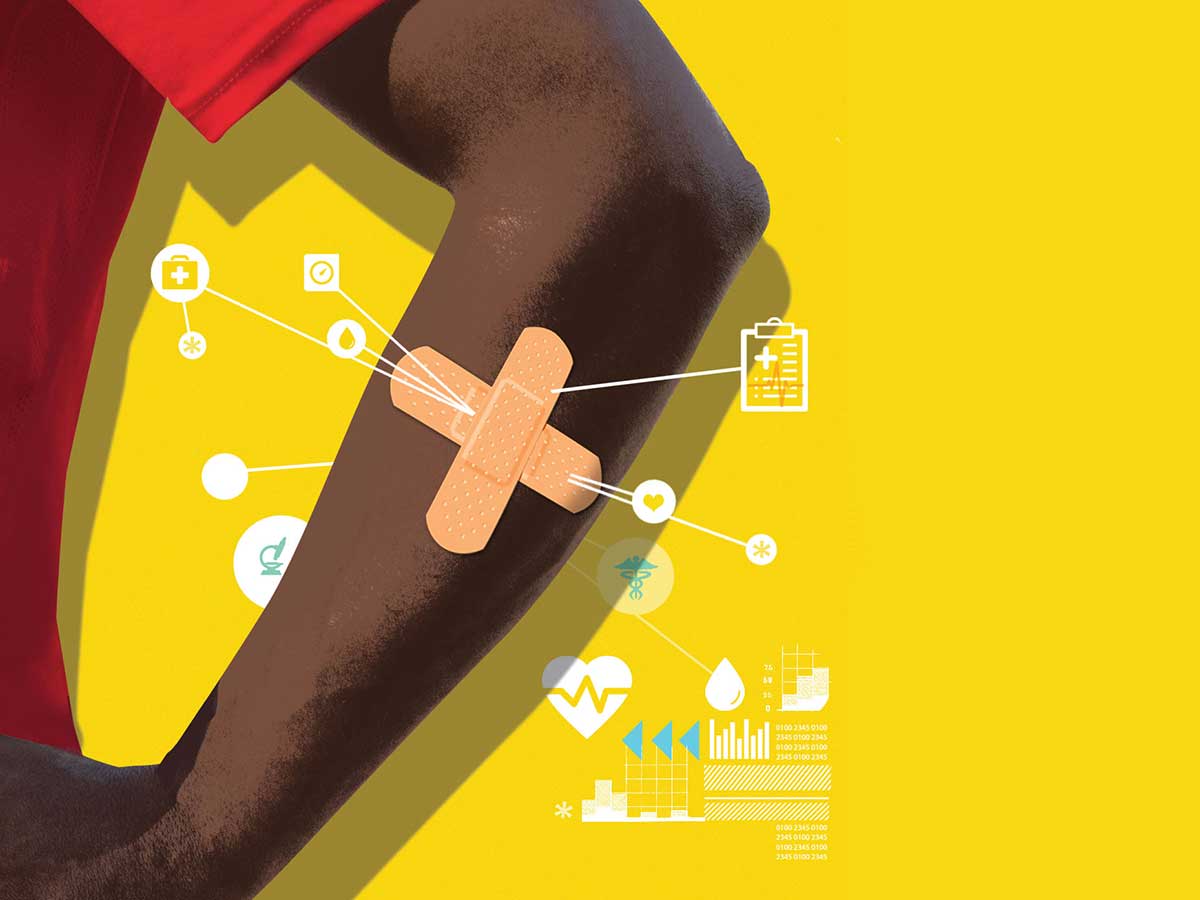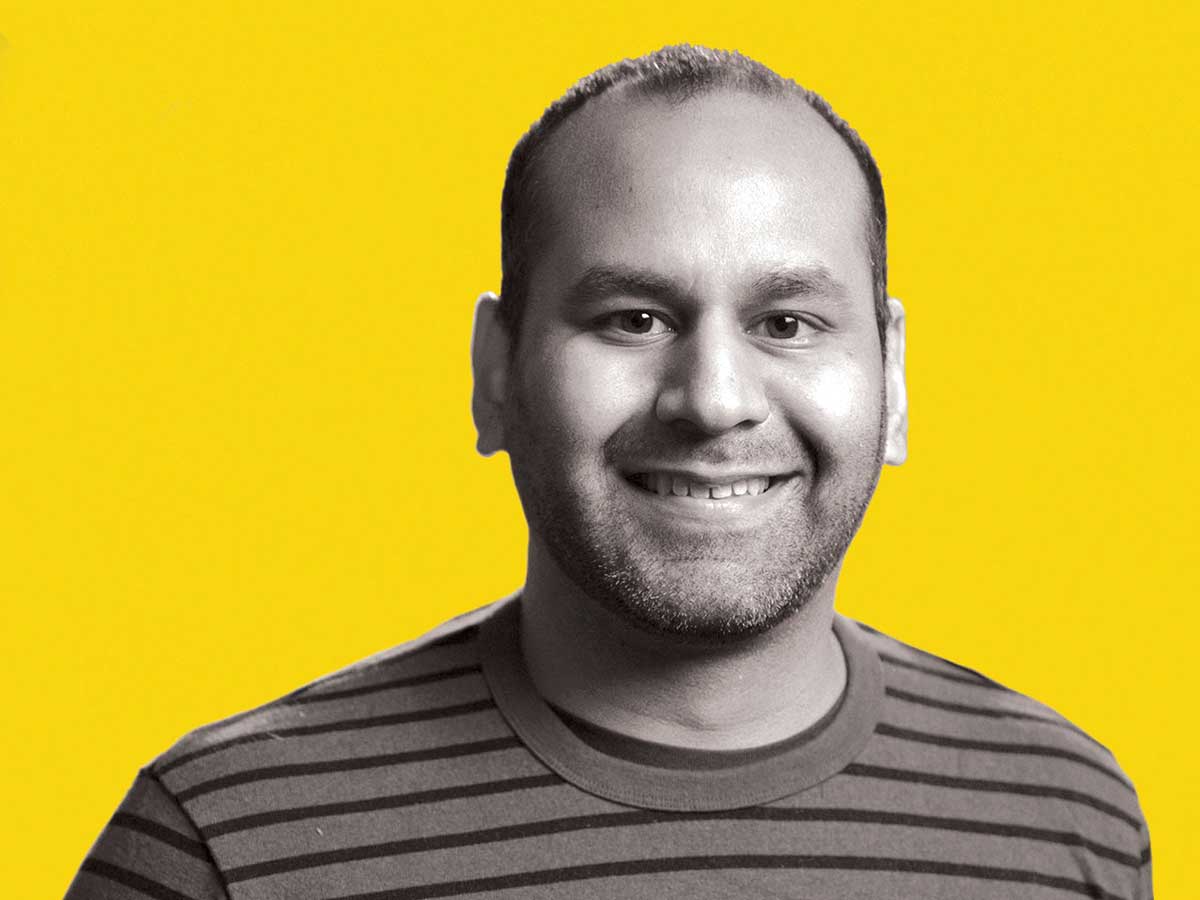
This “smart bandage” could save your life
 “With a FloPatch bandage on your neck your doctor has instantaneous access to the velocity and volume of blood flow in your heart,” explains Sachit Harish. (Illustration by Matthew Billington)
“With a FloPatch bandage on your neck your doctor has instantaneous access to the velocity and volume of blood flow in your heart,” explains Sachit Harish. (Illustration by Matthew Billington)
How smart is your bandage? Sachit Harish has one that’s a lot smarter than whatever’s in your medicine cabinet. And he plans to stick it everywhere.
Harish, a CPA, is co-founder and chief financial officer of Flosonics Medical, a fast-growing tech firm based in Sudbury, Ont., that’s developing FloPatch, a bandage-like device that allows doctors to make better decisions in emergency situations. The young company has already attracted venture capital and begun medical trials. Now, to get to the next level, it’s going through the Lazaridis ScaleUp Program at Wilfrid Laurier University in Waterloo, Ont. The program pairs ambitious entrepreneurs like Harish with some of North America’s savviest tech veterans in hopes of turning Canada into a world-beating tech powerhouse.
But first, what exactly is a smart bandage? Harish explains that when a patient arrives at a hospital with low blood pressure, perhaps due to heart failure or infection, standard medical procedure calls for the immediate delivery of fluids—often a saline solution—to get that pressure back up. But it’s difficult to know how much fluid to give. Insufficient fluids can leave blood pressure dangerously low, while too much can flood the lungs or kidneys and cause serious problems, even death. An accurate measure of blood flow in response to fluids currently takes about 20 minutes and typically requires invasive monitoring techniques, such as a catheter inserted into a vein.
 Sachit Harish, CFO of Flosonics Medical
Sachit Harish, CFO of Flosonics Medical
“With a FloPatch bandage on your neck,” Harish says, “your doctor has instantaneous access to the velocity and volume of blood flow in your heart.” Without breaking the skin, the bandage’s sensor ultrasonically monitors blood flowing through the carotid artery, which indicates activity in the heart’s left ventricle. Beat-by-beat information is relayed wirelessly to a clinician’s tablet. While the firm is currently focusing on applications in intensive care units, Harish sees a day when every patient admitted to hospital with falling blood pressure will have a FloPatch on their neck. Sales of the product, currently in clinical trial and waiting to clear various regulatory hurdles, are set to begin in 2020.
Like a lot of tech firms, the company came together when a good idea found a collection of friends and connections. Dr. Jon-Emile Kenny, a critical-care physician (and now Flosonics’s chief medical officer), figured there had to be a way to take the guesswork out of fluids delivery. He posed his dilemma to Joe Eibl, a former classmate from the University of British Columbia who has a Ph.D. in biomolecular science from Laurentian University. Eibl’s research suggested a solution via ultrasonic monitoring. He then brought on his brother Andrew Eibl, who’d worked in human resources and business analytics; he in turn brought in Harish, who went to business school at the University of Ottawa with Andrew. Harish jumped at the chance to get in on the ground floor. “I’ve always had the entrepreneurial itch,” says Harish, who previously worked as an auditor at a Big Four accounting firm before getting involved in startups in real estate and the tech field. “As an auditor, I’ve seen what works and what doesn’t. Now I have a chance to implement the best of what I’ve learned with fresh processes and procedures. It’s an ideal scenario.”
The company raised $5 million in venture capital financing last year (Harish got final sign-off while on his honeymoon in Biarritz, France) and has since grown to 15 employees, albeit with a diverse geographic footprint. Research and development is based in Toronto “so we can take advantage of Sunnybrook hospital’s world-class ultrasound development lab,” says CEO Joe Eibl. Clinical trials and corporate offices are in Sudbury, the hometown both of Kenny and the Eibl brothers, which allows the firm to benefit from the Health Sciences North Research Institute and the Northern Ontario School of Medicine. Harish handles finances remotely from his home in Ottawa.
Flosonics sees its technology being adapted for many uses, including outpatient monitoring, telemedicine and military applications. They hope the Lazaridis ScaleUp Program can help make it a player in the $465-billion global market for medical devices, of which Canada represents a mere two per cent. (The U.S. comprises 43 per cent.) The program acts as a sort of gifted class for the nation’s most promising young tech entrepreneurs. Canada boasts a robust startup culture, but has long struggled to create globally dominant tech firms of the type that seem to spring up naturally from California’s Silicon Valley. The biggest obstacle, observes Kim Morouney, managing director of the program, is a severe shortage of tech-savvy senior management talent. “To get beyond the startup phase, you need access to managers who have experience growing a company to global size,” she says. Canada has relatively few tech firms of globally competitive size to begin with, and the experienced talent we do have is often lured away by Silicon Valley.
Harish sees a day when every patient admitted to hospital with falling blood pressure will have a FloPatch on their neck
Financed by famed Canadian tech investor Mike Lazaridis—co-founder of Research In Motion, now known as BlackBerry—and the Ontario government, the program is taking in two cohorts of 10 firms this year. Previous years’ star pupils include Terramera, a rapidly growing Vancouver-based biopesticide firm; Tulip Retail, a mobile app for retail store associates that recently raised $50 million in financing; and Unata, an online grocery-buying platform that was acquired last year for $65 million (U.S.) by American industry leader Instacart. (Unata is retaining its Toronto offices.)
The year-long program involves monthly workshops across Canada and the U.S., including Silicon Valley, with presentations by veteran entrepreneurs who have experience in crucial areas such as marketing, finance and design. The program also pairs firms with mentors to provide customized advice and direction. “To be able to talk to the person who took the iPod team at Apple from 40 people to thousands is an awesome opportunity,” says Harish. CEO Eibl appreciates the practical advice: “They describe challenges we are facing at that very moment and then give real-world examples of how to fix them. We all sit there and look at each other as the light bulbs go off.” Just being able to rub shoulders with fellow entrepreneurs is proving to be a major benefit. The monthly sessions frequently become networking opportunities for the assembled founders to ask each other questions. Given his CPA experience, something in short supply among most new tech firms, Harish often finds himself a popular resource: “I’ll get asked basic questions, from the difference between a controller and a director of finance to providing expectations on typical salary ranges. We all want to see each other succeed.”
For Morouney, this burgeoning network effect is actually part of the bigger plan. “Rather than have our most promising young tech companies feel they have to move away to establish themselves globally, we want them to stay in Canada,” she says. “And if they do stay, then they’ll be available to mentor and support the next generation. We’re trying to seed the future.” As Harish puts it: “The problems of scaling up are issues for companies everywhere. It’s great to have a Canadian perspective and Canadian solutions.”